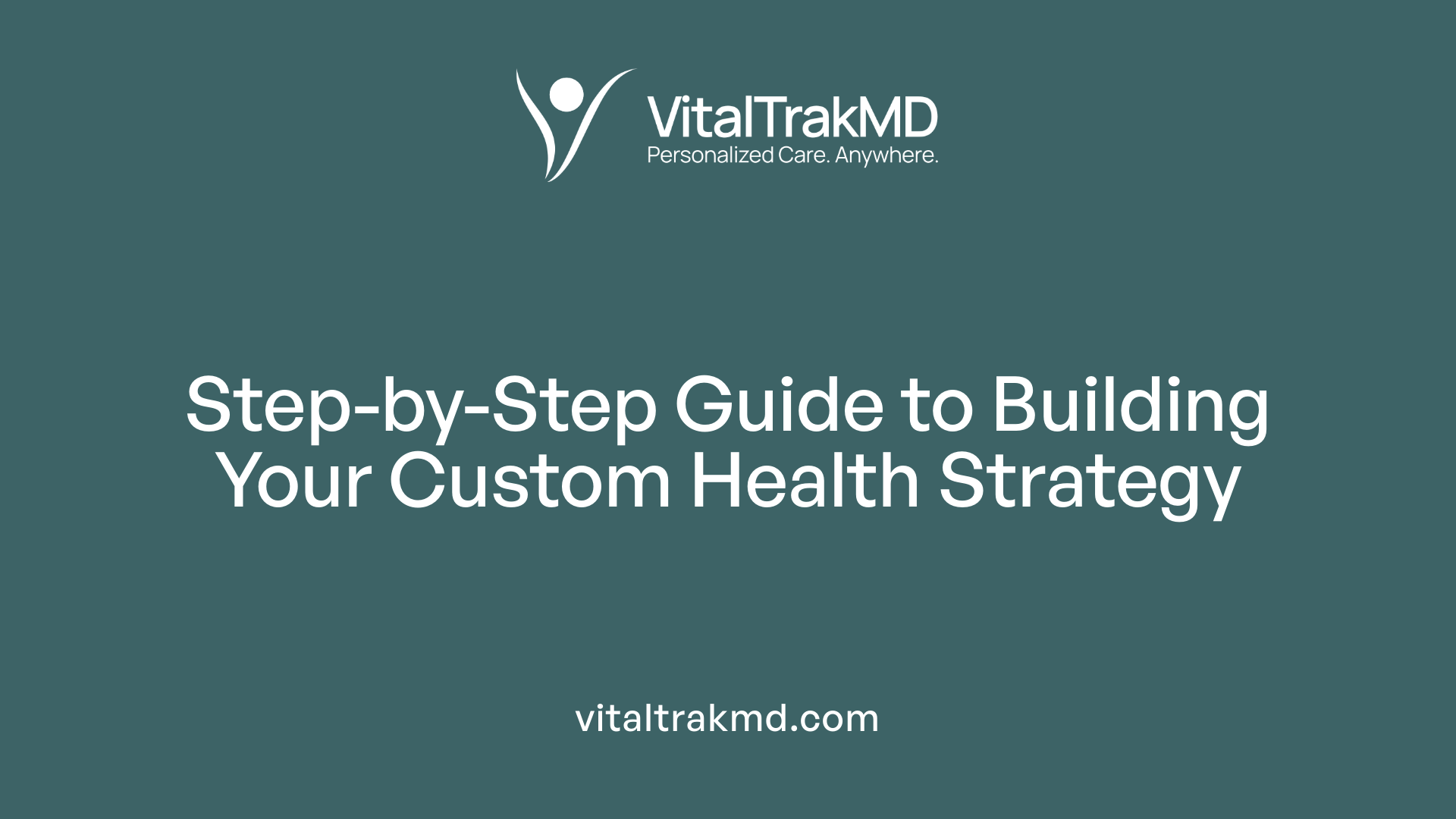Building Confidence in Health Choices Through Personalized Plans

Understanding the Power of Personalization in Health Management
In today's healthcare landscape, a shift towards personalized health plans is redefining the way individuals engage with their health and wellness. These customized strategies, driven by individual needs, preferences, and lifestyles, foster confidence, improve health outcomes, and strengthen the patient-provider relationship. This article explores how personalized approaches are making health choices more informed, effective, and empowering.
What is a Personalized Health Plan?

Definition and core components
A personalized health plan is a tailored strategy that focuses on an individual's specific medical, emotional, and daily living needs. It incorporates detailed assessments of health status, lifestyle, and personal preferences to create a comprehensive care approach. This includes setting SMART goals, medical management plans, wellness activities, and safety measures. The plan also emphasizes ongoing monitoring and flexibility to adapt to changing health circumstances.
Development process involving healthcare professionals and technology
Creating a personalized health plan involves collaboration between healthcare professionals, patients, and often family caregivers. The process begins with thorough health risk assessments (HRAs), comprehensive health evaluations, and tools like the Personal Health Inventory (PHI). These assessments explore holistic health domains including spirituality, emotional well-being, and relationships.
Technological tools such as wearable devices and mobile health applications play a significant role in tracking real-time health data. This data supports timely adjustments and ongoing engagement, ensuring the care plan remains relevant and effective. Platforms like RapidAWV™ facilitate administrative tasks and integration of personalized care components.
Target populations like seniors and chronic illness patients
Personalized health plans are especially valuable for seniors and individuals managing chronic health conditions like diabetes, heart failure, or mental health issues. For older adults, these plans enhance independence, safety, and quality of life by addressing their unique needs in everyday routines.
Patients with long-term conditions benefit from tailored treatments that improve disease management, reduce hospital visits, and lower healthcare costs. By incorporating social determinants of health and lifestyle factors, these plans support better clinical outcomes and foster stronger patient-provider relationships.
In summary, personalized health plans are dynamic, patient-centered strategies that leverage detailed assessments, collaborative planning, and technological support to improve health, safety, and well-being for diverse populations.
Defining Personalized Healthcare and Its Proactive Approach
What is personalized healthcare?
Personalized healthcare is a proactive approach to medicine that tailors prevention, diagnosis, and treatment strategies to each person’s unique genetic profile, medical history, lifestyle, and environmental exposures. Instead of using a standard, one-size-fits-all method, it considers individual differences to optimize health outcomes.
This approach involves creating collaborative health plans developed through thorough risk assessments, including genetic testing, clinical evaluations, and patient self-reflection on wellness goals. By integrating various data sources, personalized healthcare helps in early disease detection and timely interventions, which can prevent severe health issues and reduce the need for invasive procedures.
Modern technology plays a crucial role in this field. Genomics provides insights into genetic susceptibilities, while biomarker analysis helps identify specific disease risks. Artificial intelligence (AI) and machine learning analyze large datasets to predict health risks and suggest tailored treatment options, making care more precise and effective.
The overall goal of personalized healthcare is to shift away from reactive treatment—where interventions occur only after illness develops—to a more proactive stance that emphasizes prevention and early management. This not only enhances individual health and quality of life but can also lower healthcare costs by reducing hospitalizations and unnecessary treatments.
By focusing on each person's unique traits and leveraging cutting-edge technologies, personalized healthcare transforms traditional medicine into a more targeted, efficient, and patient-centered practice. It fosters greater patient engagement and shared decision-making, leading to better adherence to treatment plans and improved health outcomes.
Benefits of Personalization in Healthcare

What are the benefits of personalization in healthcare?
Personalization in healthcare offers numerous advantages that significantly improve patient experiences and health outcomes. One of the main benefits is empowering individuals by giving them greater control and choice over their own care. When patients are involved in shaping their health strategies through collaborative decision-making, they tend to feel more satisfied and confident about their treatment plans.
Personalized care fosters strong relationships between patients and healthcare providers. These relationships are built on trust and mutual understanding, which can lead to better communication, adherence to treatment, and overall health improvements.
Moreover, this approach is especially effective in managing complex and long-term conditions. By integrating medical, social, and community support, personalized health plans address the myriad factors influencing health. This holistic approach not only helps in controlling chronic illnesses more effectively but also reduces complications, hospitalizations, and healthcare costs.
Personalized healthcare also plays a role in reducing health disparities. It considers individual differences such as age, gender, culture, and social determinants, ensuring that care is respectful, relevant, and accessible.
Furthermore, engaging patients actively in their care encourages community participation and strengthens support networks. This community aspect enhances resilience and addresses broader social needs.
In summary, the benefits of personalized healthcare include improved health outcomes, greater patient satisfaction, enhanced management of complex health issues, and fostering a more equitable and supportive healthcare environment.
The Significance of Personalized Care Plans
Why are personalized care plans important?
Personalized care plans are vital because they serve as a foundation for empowering individuals to actively participate in their health management. By tailoring interventions to each person’s specific needs, preferences, and circumstances, these plans promote greater independence and informed choices.
A core element of personalized care is its holistic approach. It considers not only medical conditions but also social, cultural, emotional, and psychological factors that influence health. This comprehensive view ensures that care addresses all relevant aspects of a person's life, leading to more effective and meaningful health outcomes.
Collaboration plays a key role in the success of these plans. Patients are engaged in discussions with their healthcare providers to set realistic goals and develop strategies that align with their daily routines and values. Support networks, including family and community resources, are often integrated into the planning process to foster ongoing support.
Research indicates that such tailored approaches yield positive results. Patients tend to experience better management of chronic illnesses, higher satisfaction with care, and improved overall health. Additionally, personalized care plans can reduce unnecessary interventions, hospitalizations, and healthcare costs.
In a nutshell, personalized care plans are essential tools that combine compassion, customization, and collaboration to improve the quality of healthcare and the patient experience.
Developing an Effective Personalized Health Plan

How can someone develop an effective personalized health plan?
Creating a personalized health plan starts with a comprehensive assessment of your current health status. This includes reviewing your medical history, recent physical examinations, and, if relevant, genetic testing to identify genetic predispositions or risk factors.
Once you understand your baseline health, set clear, actionable goals using the SMART framework—making objectives Specific, Measurable, Attainable, Relevant, and Time-bound. For example, aiming to walk 30 minutes daily or eat five servings of vegetables each day helps you stay focused and motivated.
Design a balanced and flexible nutrition plan that incorporates whole grains, lean proteins, fruits, and vegetables. Adapt your meal choices to suit your schedule and social life, ensuring consistency without feeling restrictive.
Physical activity should be prioritized, with routines that fit your preferences and lifestyle. Incorporate stress management practices like mindfulness, meditation, or journaling to enhance emotional well-being.
Regular review and adjustment are vital. Every 3 to 6 months, evaluate your progress, reassess your goals, and modify your plan as needed. This could involve increasing activity levels, changing dietary habits, or adding new health practices.
Finally, include preventive health measures such as skin self-examinations following the ABCDE rule for moles, routine screenings, and annual health checks. These practices help detect potential issues early and support ongoing health optimization.
Developing a personalized health plan is a dynamic process that requires ongoing commitment, flexibility, and regular reassessment to ensure it continues to meet your evolving health needs and lifestyle changes.
Role of Technology and Monitoring in Personalized Health Plans

How can technology enhance personalized health plans?
The integration of technology is transforming how personalized health plans are developed and managed. Wearable devices, such as fitness trackers and health monitors, enable continuous collection of vital signs, activity levels, sleep patterns, and other health data. Mobile health applications further facilitate tracking and managing health metrics in real-time, providing immediate feedback to patients and healthcare providers.
Platforms like digital health monitors and telehealth applications make it possible to review data regularly, which is crucial for early detection of potential health issues. This ongoing monitoring supports timely, personalized treatment adjustments, helping to prevent complications before they become serious.
Regular review of accumulated data fosters a proactive approach, with healthcare teams and patients working collaboratively to modify care plans based on current health status. Digital tools also facilitate communication through virtual consultations and follow-ups, ensuring that care remains aligned with the individual's changing needs.
This seamless use of technology enhances accountability and engagement, empowering patients by making health management more accessible and immediate. Ultimately, it contributes to better health outcomes, greater confidence, and more efficient, targeted care efforts.
Integration of Social and Community Factors in Personalized Plans
How do social determinants and community support influence personalized health plans?
Personalized health plans take into account not only medical and genetic factors but also social determinants of health (SDOHs). These include critical elements like access to nutritious food, stable housing, employment, education, and social connectivity. Recognizing these factors allows healthcare providers to craft more effective, holistic interventions tailored to each individual's unique circumstances.
Community support and resources play a vital role in this process. For instance, local food banks, housing assistance programs, and social groups can provide practical and emotional support, reducing barriers to health maintenance. Incorporating community resources into care plans enhances engagement and adherence by making health strategies more accessible and relevant.
Cultural and personal preferences are equally important. Respecting an individual's cultural background, beliefs, and personal choices ensures that health interventions are acceptable and aligned with their values, increasing the likelihood of successful implementation. This approach fosters trust and empowers patients, making them active partners in their care.
By integrating social and community factors, personalized plans move beyond purely clinical targets to address the broader environment influencing health. This comprehensive perspective leads to more effective outcomes, promotes equity in healthcare, and supports individuals in achieving better overall well-being.
| Aspect | Impact | Examples |
|---|---|---|
| Social determinants of health | Address barriers, improve access, enhance adherence | Housing programs, food security initiatives, transportation services |
| Community support | Provide emotional backing, practical help, social engagement | Support groups, local health advocacy networks, community centers |
| Cultural and personal preferences | Tailor care to values and beliefs, ensure acceptability | Dietary choices respectful of cultural traditions, language considerations |
This integrated approach demonstrates that considering social and community factors is essential for creating truly personalized, effective healthcare plans that improve quality of life and long-term health outcomes.
Effective Use of Data, Goals, and Monitoring for Better Outcomes
How does SMART goal-setting contribute to personalized health plans?
Setting SMART (Specific, Measurable, Attainable, Relevant, Time-bound) goals is fundamental for clear and effective health planning. These criteria help patients and clinicians define focused objectives, such as managing blood sugar within a certain range or increasing daily physical activity by a set amount within a specified timeframe. By establishing concrete targets, individuals can track progress more easily and stay motivated. SMART goals also facilitate communication, making it easier for healthcare providers to assess achievements and adjust strategies as needed.
Why is regular reassessment and updates important?
Health is dynamic, and personalized plans need to evolve accordingly. Regular reviews—through scheduled health evaluations, data analysis from digital tools, and patient feedback—enable timely modifications to treatment and wellness strategies. This ongoing process ensures that interventions remain relevant, effective, and aligned with the individual's changing health conditions or life circumstances. It also helps identify emerging risks early, promoting proactive management and avoiding costly complications.
How does patient engagement and feedback enhance success?
Active patient participation is crucial for the long-term effectiveness of personalized plans. When individuals are involved in goal-setting and decision-making, they develop a sense of ownership, which increases adherence and motivation. Feedback from patients about their experiences, challenges, and preferences helps healthcare providers tailor interventions more precisely. This collaborative approach fosters trust, improves communication, and heightens satisfaction, ultimately leading to better health outcomes. Integrating technology, such as real-time monitoring devices and health apps, supplies continuous data streams. This information supports dynamic adjustments, enabling healthcare teams to intervene early if issues arise.
What strategies ensure ongoing success in personalized health planning?
Strategies like setting SMART goals establish clear pathways to achievement. Regular health assessments, data review, and plan adjustments keep interventions relevant and effective. Engaging patients actively and integrating their feedback creates a partnership that boosts motivation and adherence. Utilizing digital tools and continuous monitoring allows for proactive care, enabling timely responses to health changes. This comprehensive approach—focusing on goal clarity, adaptability, patient involvement, and technology—ensures sustained success in personalized health management, resulting in improved clinical outcomes, increased confidence, and a better quality of life.
The Evidence Supporting Personalized Care's Effectiveness

What does research say about personalized care planning?
Research into personalized care planning provides strong evidence of its benefits, especially for adults managing long-term health conditions. A comprehensive review of 19 studies involving over 10,856 participants with conditions such as diabetes, mental health issues, heart failure, renal disease, and asthma reveals that personalized care approaches lead to notable improvements in health.
These studies show that personalized care can make a difference in key clinical markers. For instance, patients often experience reductions in glycated hemoglobin (HbA1c) levels, which indicates better blood sugar control, and decreases in systolic blood pressure, lowering cardiovascular risks.
Beyond physical health, personalized care planning positively impacts psychological well-being. Notably, patients report decreased depression symptoms, reflecting improved mental health and overall satisfaction.
Personalized plans also boost patients' confidence and ability to manage their health better. Indicators such as self-efficacy and self-management skills show measurable improvements, empowering patients to take an active role in their care.
Importantly, these benefits occur without significant adverse effects, emphasizing that personalized care is both safe and effective. The evidence underscores that comprehensive, well-integrated interventions tailored to individual needs tend to produce better health management, higher patient satisfaction, and potentially lower healthcare costs.
Overall, personalized care planning demonstrates moderate yet meaningful improvements across physical, mental, and self-management outcomes, validating its role as a vital component of long-term health strategies.
Fostering a Collaborative and Empowered Healthcare Environment
Personalized health plans are transforming healthcare by empowering individuals, fostering trust, and encouraging active participation. This collaborative approach not only enhances clinical outcomes but also elevates patient satisfaction and confidence in health decisions. As technology advances and understanding of social determinants deepens, personalized care continues to evolve, promising a future where every individual’s unique health journey is supported with compassion, precision, and respect. Embracing this change is essential for building a more inclusive, effective, and empowering healthcare system.
References
- Personalized Health Planning in Primary Care Settings - PMC
- The Role of Personalized Healthcare - ChartSpan
- Customized Care at Home: The Benefits of Personalized Care Plans
- What is Personalized Health Plans (A Small Guide) | Cura4U
- Personalised care planning for adults with chronic or long‐term ...
- Empowering Patients Through Personalized Care Plans
- Elevate Your Health with Personalized, Compassionate Care
- The Importance of Personalized Care Plans when Aging in Place
- How Personalized Care Plans Improve Chronic Disease Outcomes
- How To Customize Your Care Plans: The 5 Essential Steps
Recent articles
Want to Feel Better and Live Healthier?
Join hundreds of patients taking control of their health with personalized care that fits their life – not the other way around.
Rated 4.8/5 by 32+ customers







